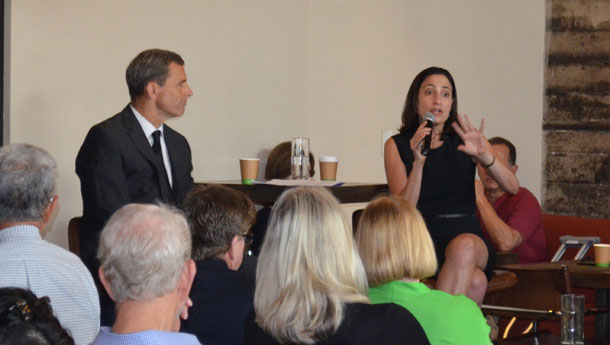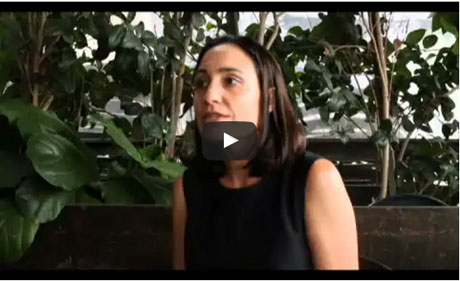 Terry McCarthy with Dalia Dassa Kaye
Terry McCarthy with Dalia Dassa KayeThe Iran nuclear deal is not perfect, will not end all the other problems in the Middle East, and might not even lead to liberal reformers gaining the upper hand over conservative forces inside Iran, as the deal's backers hope, according to Dalia Dassa Kaye. "Anyone predicting the future in Iran doesn't know what they are talking about," said Kaye, the Director of the Center for Middle East Public Policy at RAND Corporation.
In fact it is precisely because Iran is so unpredictable that Kaye thinks the deal announced in July is so important. "I believe in this deal because I'm not sure Iran will moderate," Kaye told a sold-out LAWAC Global Café breakfast meeting on August 19th. "Because they are a dangerous state and we need to do what we can to contain them and I think this deal is a good start," she said. Before the deal, Iran was estimated to be two to three months away from "breakout" status - the ability to make a bomb. The terms of the nuclear deal roll back that break-out time substantially.
"There are a whole bunch of restrictions put on Iran's nuclear program basically trying to block every pathway that Iran could potentially pursue to weaponize its civilian program - the uranium side and the plutonium side," said Kaye. It "reduces them to the level that Iran could not quickly break out to weaponize a nuclear capability."
One of the main criticisms of the deal is that Iran, which has an established record of cheating on nuclear deals dating back over more than a decade, could very well cheat in small but incremental steps on this deal that might be hard to pick up or stop until it is too late. There are provisions for inspections that must be carried out within 24 days, and there is a formula for sanctions to "snap back" if a violation is found - but the chances are that once sanctions have been lifted, the Russians and the Chinese are going to be very unlikely to reimpose sanctions.
"This is going to be a long tortuous process," said Kaye. "There's going to be crises non-stop so it will be very interesting to watch," she said. But one effect of the deal is that the inspection's provisions ensure the international community will have many more "eyes-on" than it currently has on Iran.
Congress, which will return from break September 8th, has until September 17th to vote on a resolution to support or reject the 159 page deal. If Congress were to reject the deal, Kaye said we'd be back to square one. "My concern is, if you reject this deal, you lose the restrictions on Iran and Iran will have no incentive to abide by the agreement...The effect internationally is devastating," she said. The US standing overseas amongst our allies would take a big hit, and Iran would have no reason not to work full out to build a bomb. Which means either living with a nuclear Iran, or going to war with Iran - and that is not something that Americans want, nor is the military option of bombing Iran likely to be very effective, according to Pentagon war-modelling.
Kaye pointed out that although the current nuclear deal will henceforth be associated with President Obama, the negotiating process started under President George W. Bush. "Despite the partisanship now, there was a bipartisan consensus that war and military action is probably not the best way to solve this," said Kaye. "Solving this thing diplomatically - that would be the preferable option."
Asked about Iran's perspective, Kaye said "the Supreme Leader, Ali Khamenei, makes the final decisions on these critical national security questions and he has backed the negotiations - and basically he's backing them because he's interested in survival." The sanctions were hurting the Iranian economy and undermining the authority of the government, so Teheran wanted to get a deal that would give them sanctions relief. Did the U.S. give up too much, or give in too early? "It was a negotiation, and in any negotiation you have to give up some things - basically both sides have to come out feeling they are the winners," said Kaye. "There is no perfect deal," said Kaye. "My cost-benefit assessment suggests that this deal is actually a pretty good way diplomatically to resolve this issue."
As to the position of Israel, Kaye said that "Israel is rightly concerned - not just with the nuclear issue but Iran has also supplied Hamas with missiles." But despite the strong criticism from Prime Minister Netanyahu, which she said has been handled so poorly that it has damaged relations with the US, she said "Israel's position is not monolithic." Other political figures have cautioned against "making Israel the center of the issue, when it should be a global issue."

